NEWS
BEATsepsis Supports United Against Sepsis Initiative. / 25.6.2025
The BEATsepsis consortium is proud to endorse the United Against Sepsis initiative — because together, we are stronger and can drive meaningful change in sepsis care and awareness.
BEATsepsis, represented by ICRC team, will also actively participate in the United Against Sepsis meeting on September 9, 2025, in Brussels, where the team will present a talk titled: “Exploring the Sepsis Burden and Quality of Life in Sepsis Survivors – Insights from BEATsepsis.”
BEATsepsis Presented at the 18th Annual Conference of the Czech Society for Intensive Medicine. / 20.6.2025
Marcela Hortová Kohoutková was invited to speak at the 18th Annual Conference of the Czech Society for Intensive Medicine (CSIM). During the presentation, the BEATsepsis consortium was introduced to the broader medical and scientific community.
The talk also highlighted the integration of Next-Generation Sequencing (NGS) technologies at the BEATsep clinical sites and their potential to support rapid and precise diagnostics in sepsis care. The presentation sparked valuable discussion on the role of advanced molecular tools in improving outcomes for critically ill patients.
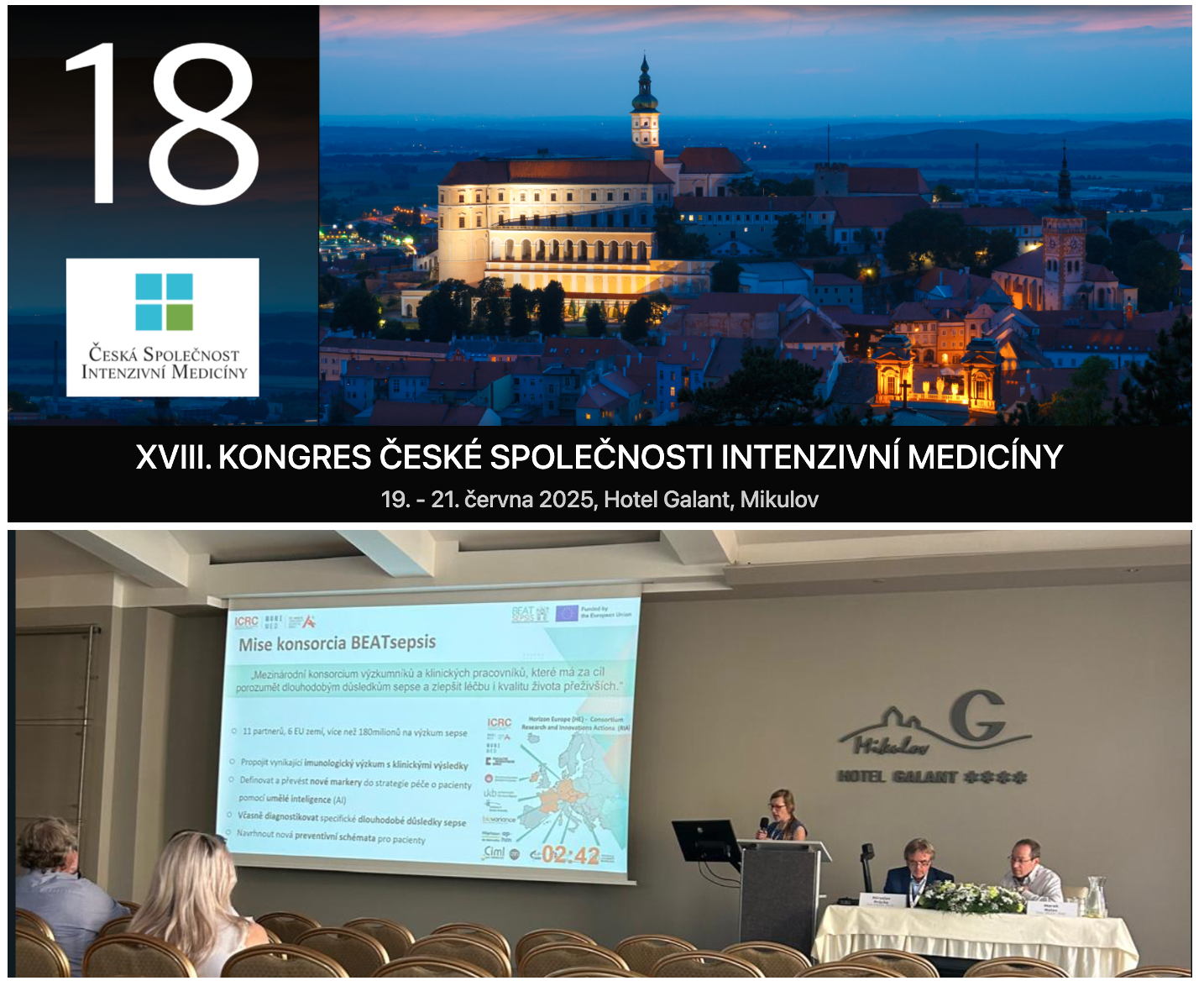
BEATsep presentation for NCP in Czechia. / 15.4.2025
The BEATsepsis project was presented by Jan Frič and Marcela Hortová Kohoutková during events organized by the National Contact Point (NCP) of the European Commission in Czechia. Both researchers shared insights not only into the BEATsep project's objectives and progress but also into its preparation and consortium establishment. The events attracted over 500 registered participants, with a focus on Horizon Europe Widening countries, helping to increase awareness and engagement across diverse research communities.
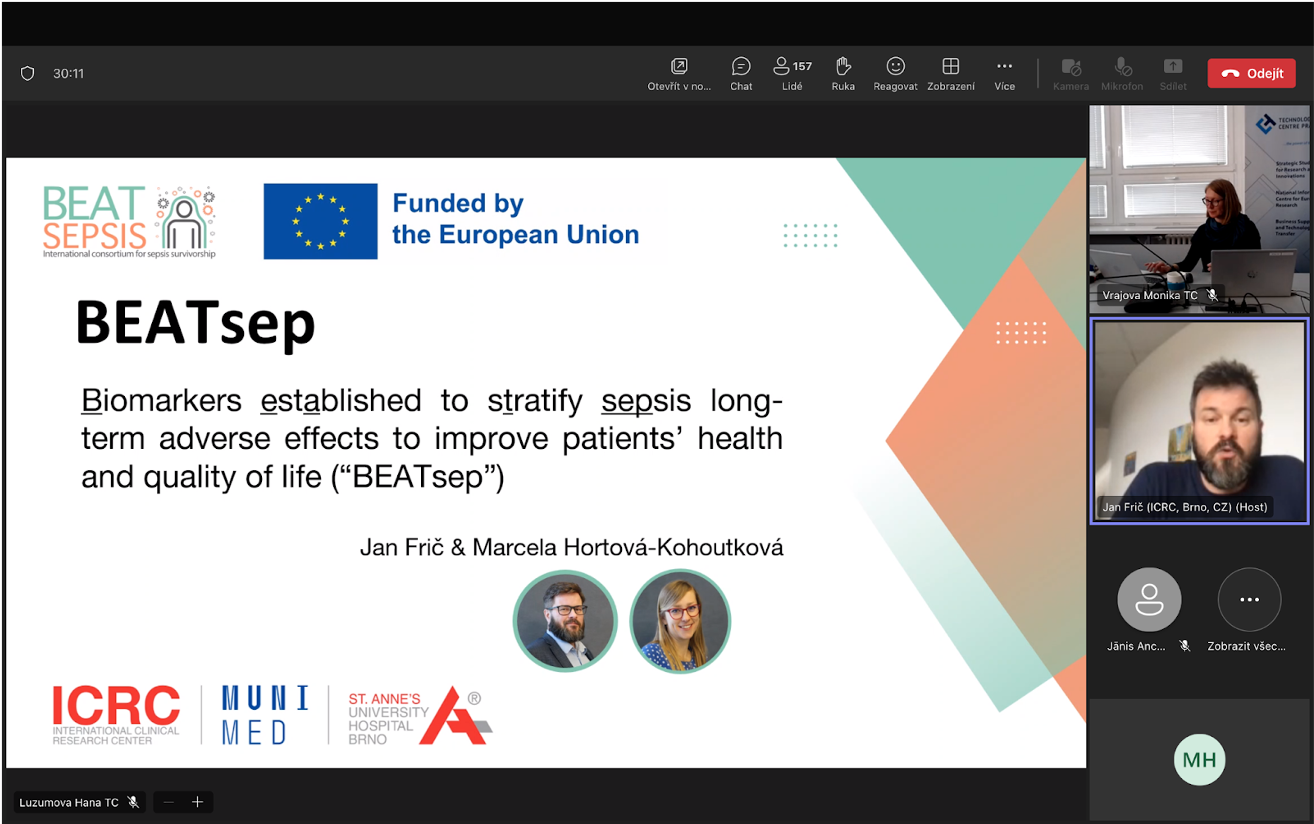
BEATsep attended ESA annual conference in the European Parliament. / 20.3.2025
BEATsepsis coordinators participated in the Annual European Sepsis Alliance Conference, held at the European Parliament in Brussels. The conference highlighted the urgent need for coordinated action on sepsis across Europe and globally.
During the event, BEATsepsis representatives engaged in fruitful discussions with key stakeholders, including the President of the Global Sepsis Alliance (GSA). As a result, BEATsepsis was invited to join the newly established Global Sepsis Innovation Platform, marking an important step toward stronger international collaboration in sepsis research and innovation.

International Recognition and Outreach: Selected Talks on World Immuno Regulation Meeting 2025 in Davos. / 17.3.2025
The BEATsepsis project was prominently featured at the World Immunoregulation Meeting 2025 in Davos, Switzerland, with two selected talks. Jan Frič presented on “Sepsis-induced tissue-specific dysregulation analysed through a model of 3D iPSC-derived organoids,” while Marcela Hortová Kohoutková spoke on “Sepsis-associated immunosuppression: long-term effects on pediatric innate immune cells and their immunometabolic status.”
Marcela Hortová Kohoutková’s contribution was further recognized with a Best Abstract Award, presented by the European Federation of Immunological Societies (EFIS)—a testament to the scientific quality and impact of the work.
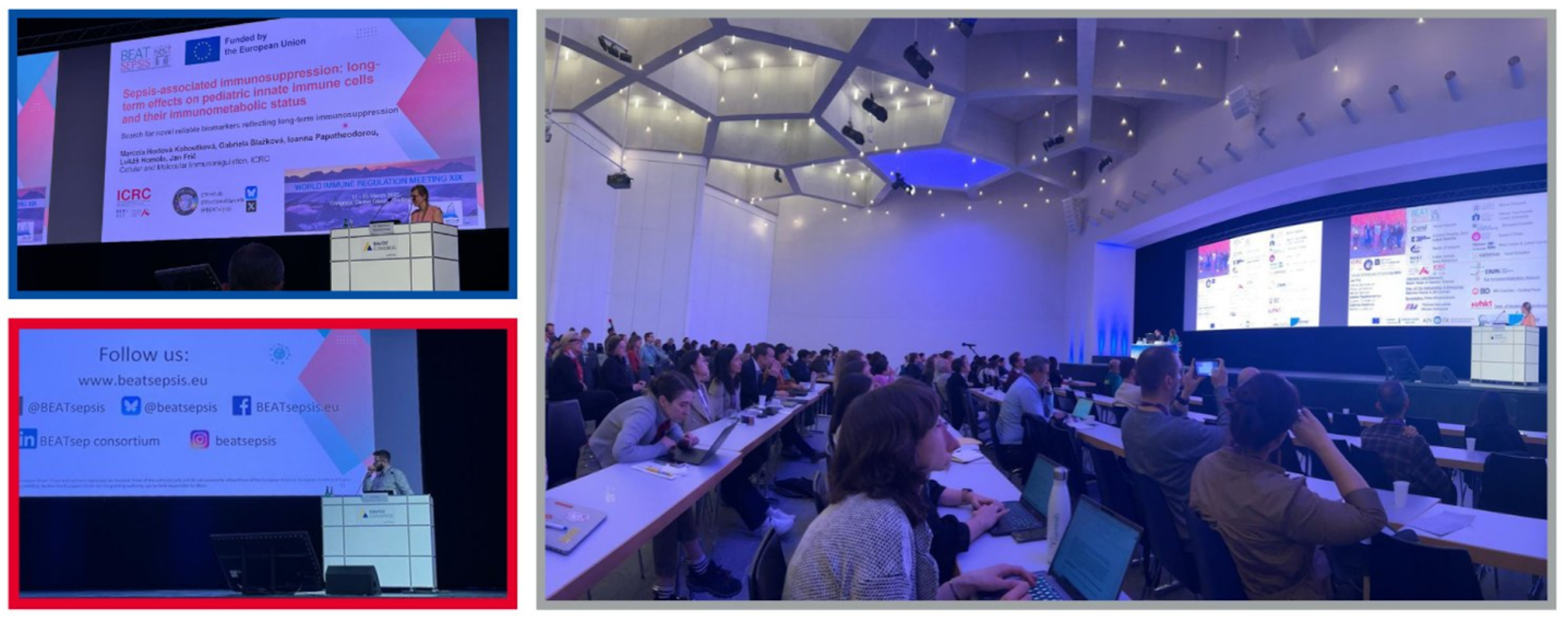
Building bridges for better care: How BEATsepsis reaches policymakers and the public. / 07.03.2025
Just as important as our biomedical research on early diagnosis and treatment of PICS, is finding ways to make these discoveries reach the people who need them. In a complex and fragmented healthcare system, this can be quite a challenge. BEATsepsis is working together with stakeholders, building bridges that connect labs, clinics and health policy making.
Státní zdravotní ústav, the Czech National Institute of Public Health and member of the BEATsep Consortium, has been actively organizing health fairs and presentations - perfect opportunities to spread awareness about sepsis and its long-term consequences. One of these events took place directly at the Ministry of Health Care of the Czech Republic, engaging government officials and policymakers in discussions about sepsis prevention and long-term care. Additionally, BEATsepsis was highlighted at the Ministry of Foreign Affairs during a meeting of the Organization for Security and Co-operation in Europe (OSCE), bringing sepsis awareness to an international policy audience.
BEATsep cooperated with GSA on Satellite Symposium - Metabolism in sepsis. / 26.2.2025
Marcela Hortová Kohoutková (ICRC FNUSA) co-organized and co-chaired a satellite symposium hosted by the Global Sepsis Alliance (GSA) in collaboration with the BEATsepsis consortium. As a direct organizer, BEATsepsis played a central role in shaping the event, which featured a scientific talk by Marcela Hortová Kohoutková.
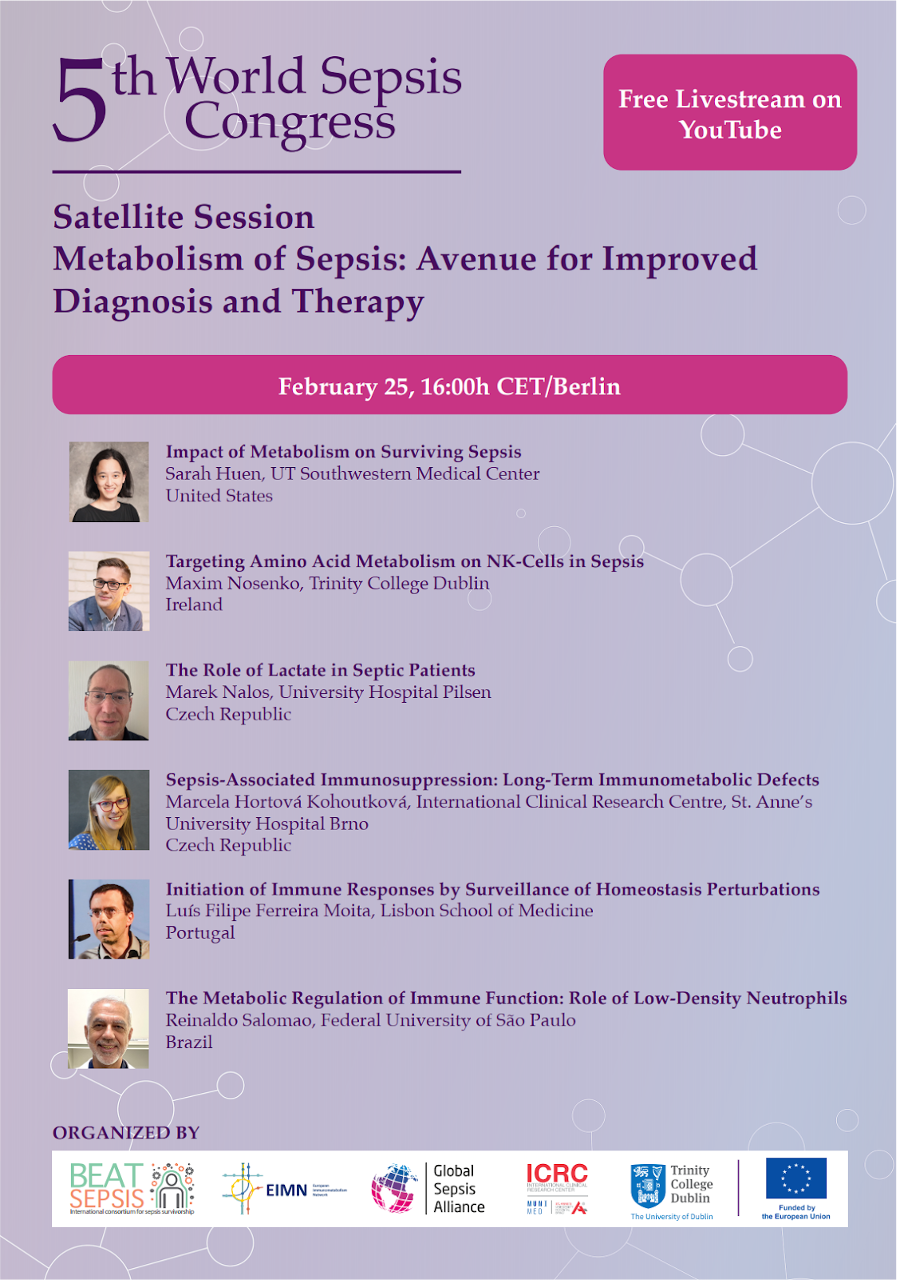
The symposium attracted strong international interest, with more than 1,900 views online, highlighting the growing global focus on sepsis research and collaboration. This talk is online on YouTube.
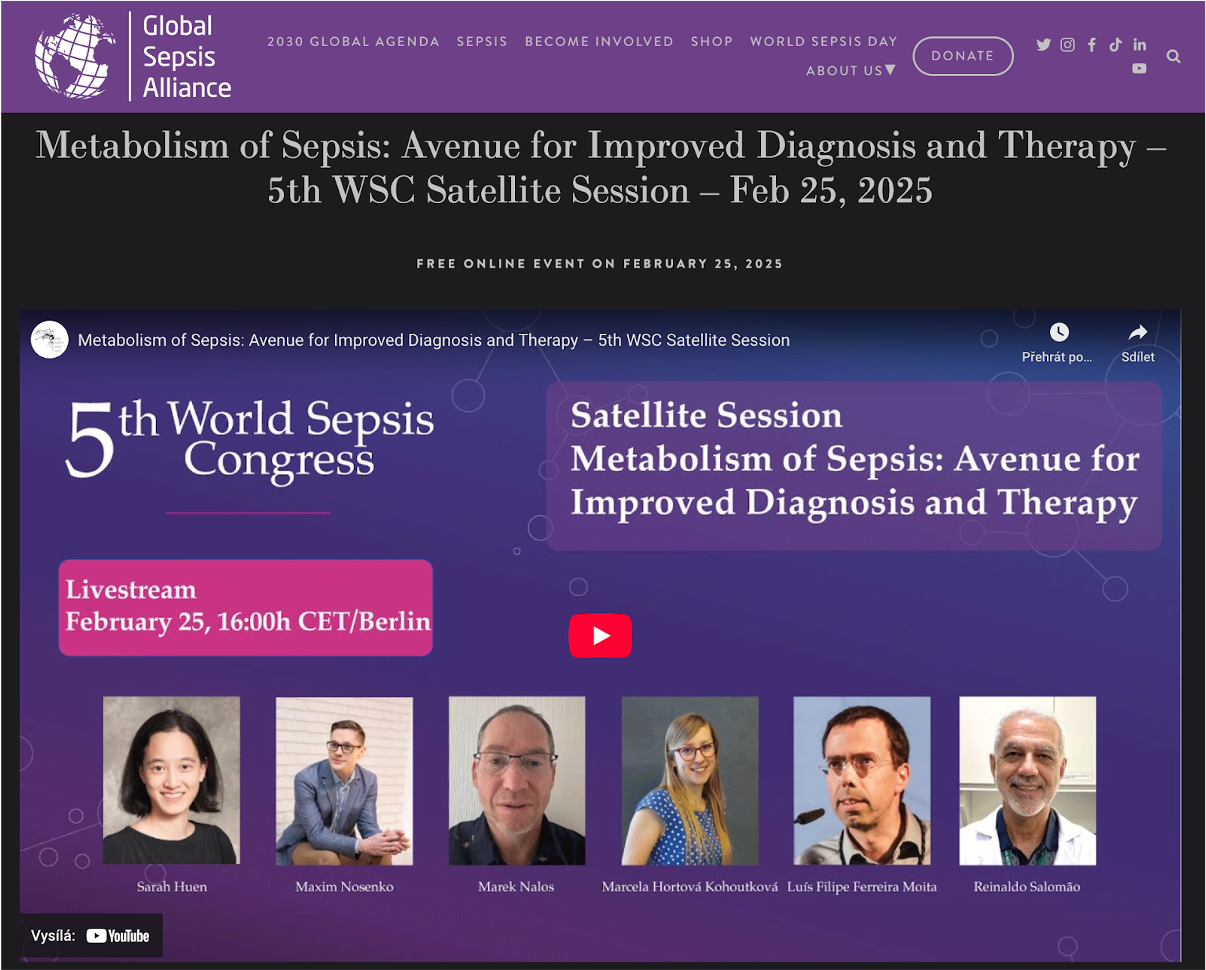
BEATsep was invited to Copenhagen and met the coordinator of the POINT project. / 9.12.2024
Jan Frič and Marcela Hortová Kohoutková (ICRC FNUSA) were invited to present at the conference “Immunometabolism – From Bench to Bedside 2024”, held at the University of Copenhagen in Denmark. The event was organized by Claus Desler, coordinator of the POINT sister project. Jan Frič and Marcela Hortová Kohoutková introduce BEATsep project to all participants. In addition to the scientific presentations, the meeting provided valuable opportunities for networking and strengthening collaborations within the immunometabolism research community.
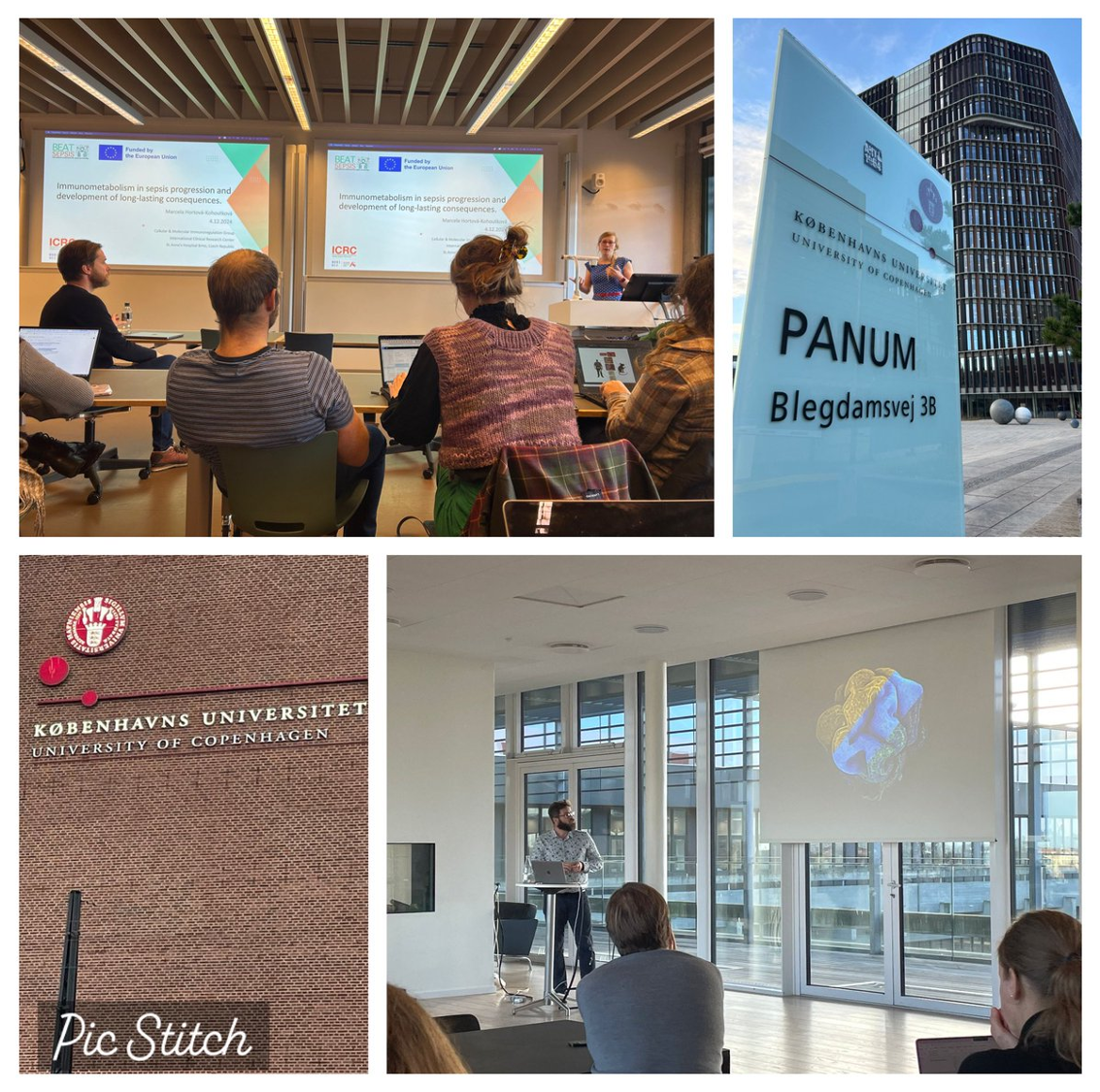
Outstanding BEATsepsis kickoff meeting in Brno celebrates the start of the project. / 26.-28.03.2024
The BEATsep consortium unites eleven partners from six European countries. Top leaders of their field come together to bundle their efforts combating sepsis and its long-term consequences. The first kickoff was hosted by BEATsep coordinators from FNUSA, in Brno, Czechia. This was the first time all partners met together in person.
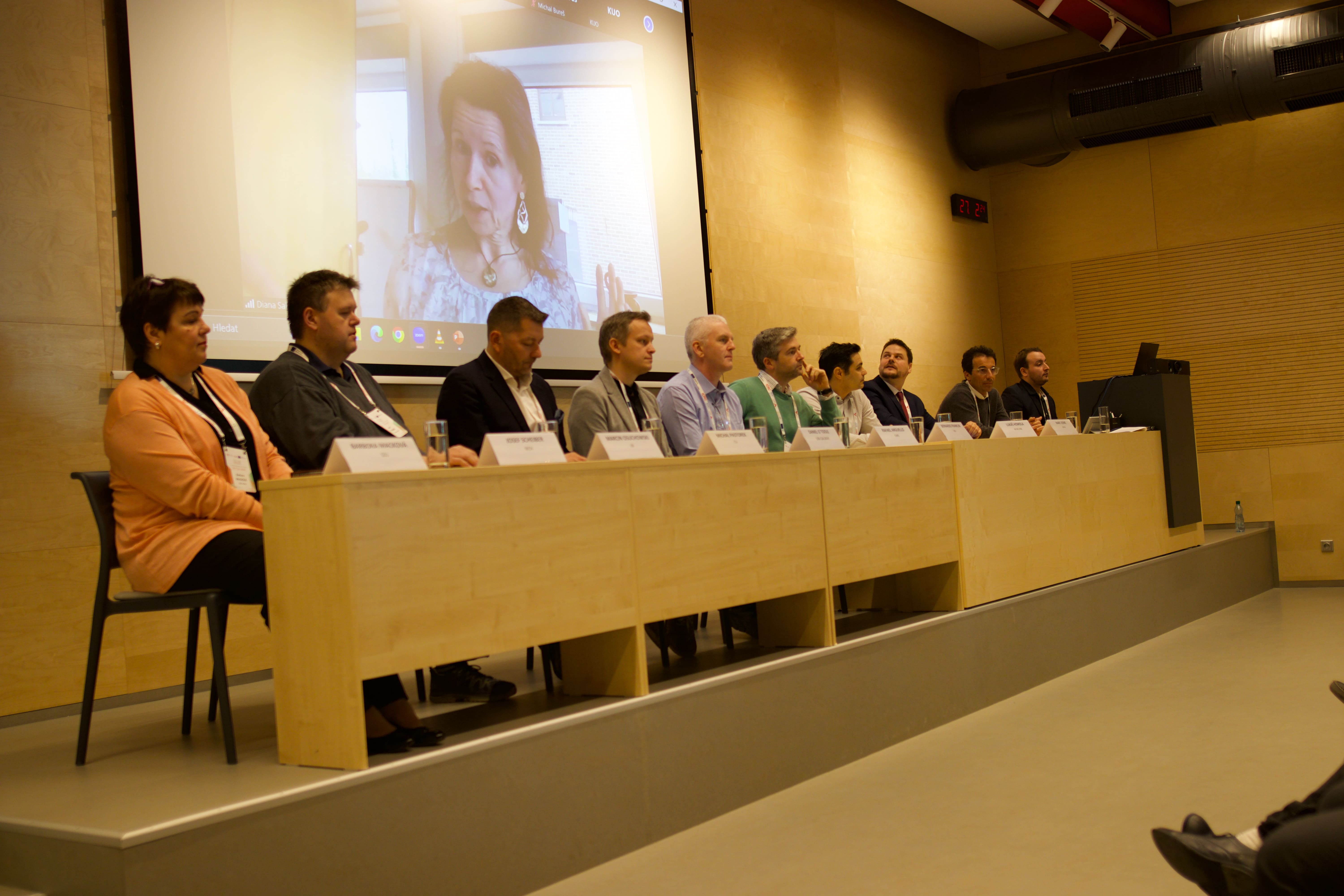
A warm Welcome in Brno
Brno did a formidable job as host. The hall in St Anne’s hospital was filled with researchers, both local and visiting, hospital staff, press, and the Who’s Who of Brno’s research landscape. The event started strong with welcome speeches by hosts Jan Frič and Marcela Hortová-Kohoutková, as well as Alessandra Martini, representing the Directorate General for Research & Innovation of the European Commission. An on-stage welcome panel demonstrated how big of a support BEATsepsis has in the Brno medical and research landscape. FNUSA Director Vlastimil Vajdák, Med MUNI Dean Martin Repko, ICRC Head of Clinic Irena Rektorová, FNUSA Deputy for Science and Research Vladimír Šrámek, and ICRC Director Michal Janota all dedicated time in their busy schedule to be present and make an active contribution to this great event.
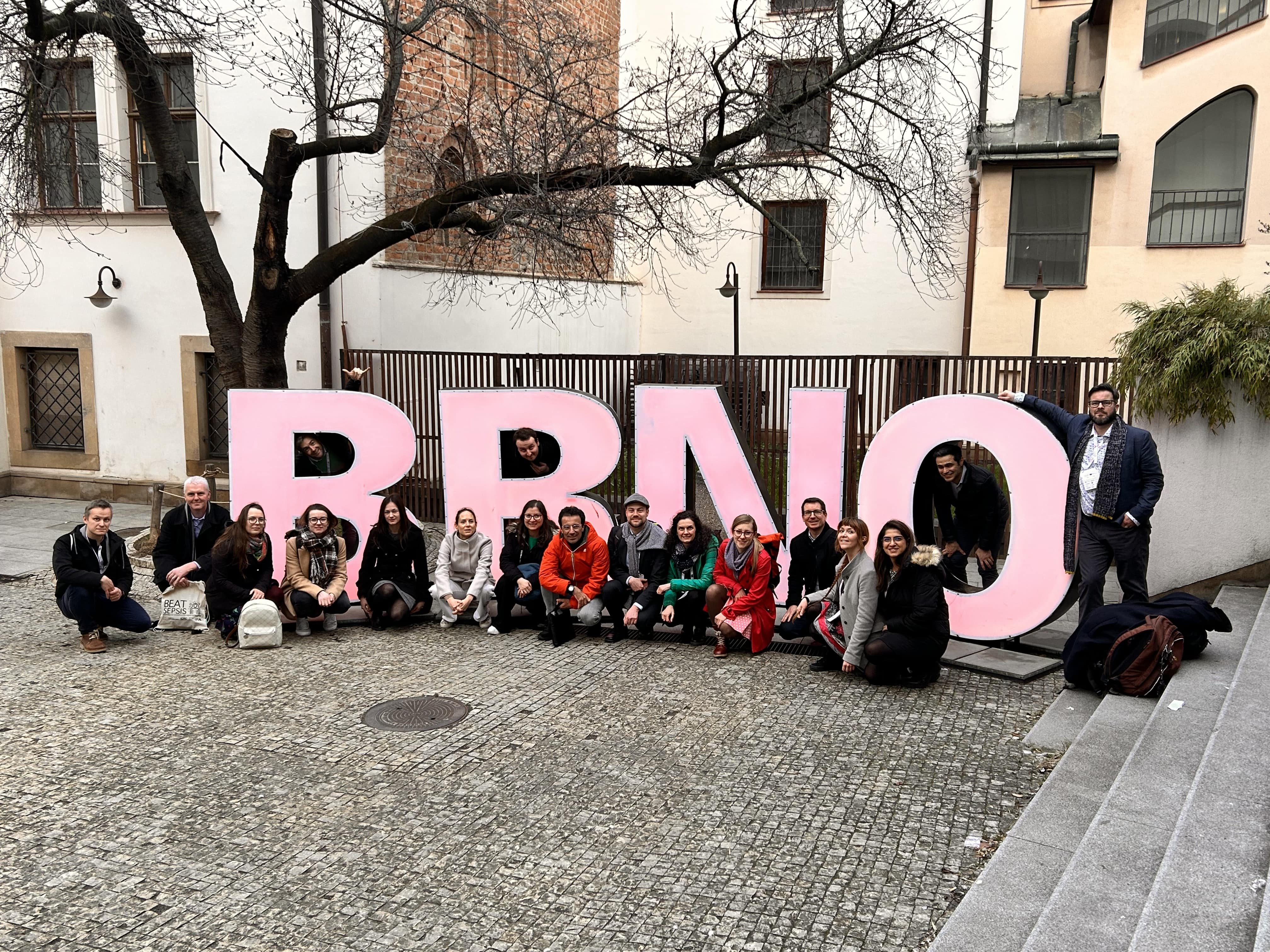
Diverse expertise driving the BEATsepsis mission
After the formal welcome, the event program dived right into the subject of introducing the project. The consortium members introduced themselves and their unique contributions. The palette is as colorful as the picture we would like to paint (as artfully, in fact, that one talk also featured a spontaneous rendition of William Shakespeare’s Henry V). While some partners take a close look into the biomolecular intricacies of the human immune system, others approach sepsis from a hands-on clinical perspective or bring in the public health perspective to ensure the project has a concrete and meaningful effect on people’s lives. We are especially proud of this great diversity of expertise among our partners.
CzechTV was on location during the kickoff, filming and doing interviews with the Frič lab. The resulting news clip was watched by 360,000 within the first days after airing alone.
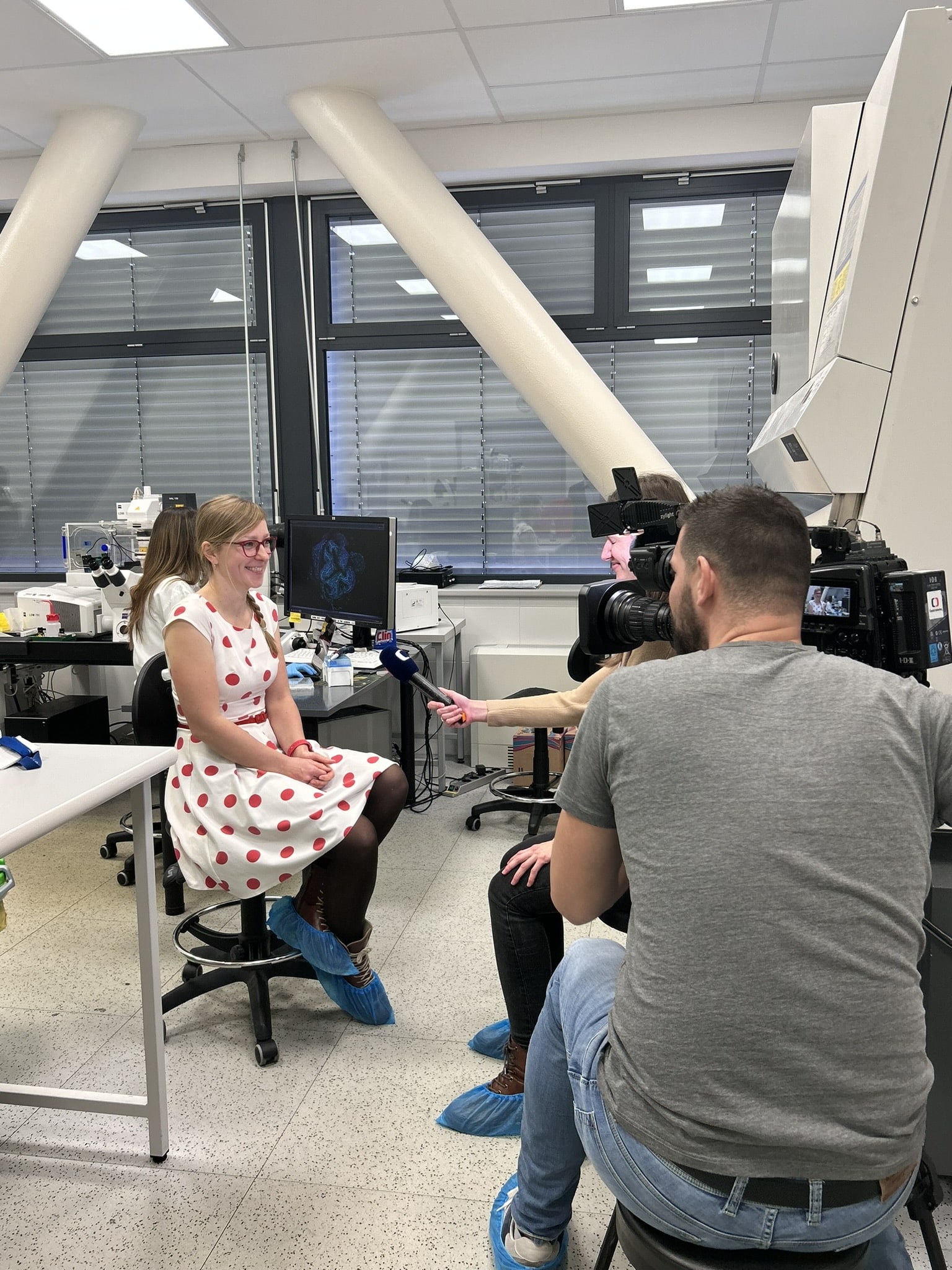
Heartfelt stories and community spirit
Dinner was preceded by short talks by clinicians, telling stories about the lives of patients surviving sepsis, reminding all of the participants of the cause they are working for together. Especially memorable was the story told by Lukáš Homola from the pediatric ICU at MedMUNI. Three girls, Christie, Maggie, and Natalie (names changed), were all treated for serious cases of sepsis. All three were cured and able to leave ICU. But while Christie and Natalie went on to live healthy lives, Maggie’s life was turned upside down by post-sepsis complications. Homola asks the question: How can we find Maggie? How can we predict post-sepsis complications? This is going to be a leading question of BEATsepsis: Who is Maggie? What makes her different?
What united the entire BEATsep kickoff meeting was a strong sense of community, united by the bond of a common cause. People just “clicked,” like puzzle pieces falling into place. Conny Schneider from LBI Trauma later recapped on Twitter: “The BEATsepsis kickoff was hands down the best scientific gathering I have been to and likely ever will.” In the name of the entire BEATsep consortium, we would like to highlight the people who made this possible: Jan Frič, Marcela Hortová-Kohoutková, Petra Kozlová. Thank you!
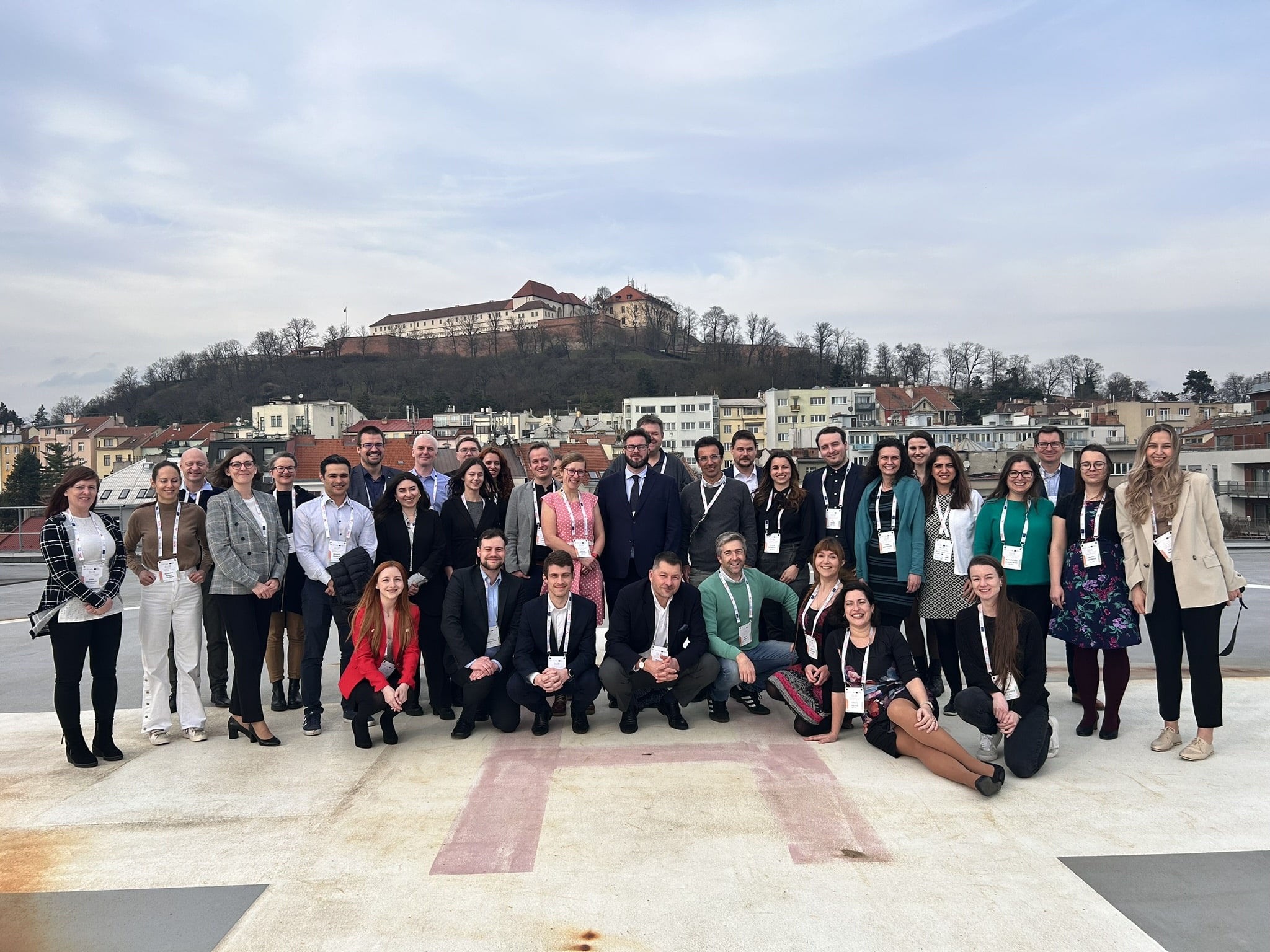
Prestigious grant HORIZON EUROPE - “BEATsep” will tackle long-term consequences of sepsis. / 11.09.2023
The research consortium BEATsep, established by the Cellular and Molecular Immunoregulation (CMI) research team at the International Clinical Research Centre (ICRC), has been awarded a 6.9 million euro HORIZON EUROPE grant. The project entitled “Biomarkers established to stratify sepsis long-term adverse effects to improve patients’ health and quality of life (BEATsep)" aims to define markers of poor recovery of patients after sepsis and septic shock. This will be achieved through the discovery of novel mechanisms and their markers predicting the decline of health-related quality of life after sepsis. Sepsis and septic shock, affecting up to 50 million people worldwide with mortality reaching 20%, leaves large cohorts of vulnerable patients suffering from long-term complications that affect their quality of life.
The BEATsep project will apply an interdisciplinary approach bringing together research and clinical teams working on specific aspects of the development, treatment and prevention of the long-term consequences of sepsis and its impact on patients' quality of life. Comprehensive clinical and research data generated during the project will be integrated using artificial intelligence algorithms into an easy-to-use predictive tool capable of identifying patients at high risk of complications. Furthermore, the consortium plans to design a tertiary prevention strategy to improve the recovery outcomes.
For the next five years, the consortium brings six European countries together in a joint mission to understand and fight the long-term consequences of sepsis.
The consortium is coordinated by ICRC-FNUSA and will consist of leading European institutions including: 1) CIML - Centre d'immunologie de Marseille-Luminy – (Aix-Marseille Université/CNRS/Inserm); 2) The Institute of Innate Immunity, at the Medical Faculty of the University of Bonn, Germany; 3) Faculty of Medicine at the Comenius University in Slovakia; 4) the Ludwig Boltzmann Institute for Traumatology, Vienna, Austria; 5) BioVariance GmbH, Germany; 6) Masaryk University, Brno, Czechia; 7) National Institute of Health, Prague, Czechia; 8) University of Galway and 9) APHM - Marseille Hospitals. BEATsep assembles renowned experts in immuno-metabolism and epigenetics, immunophenotyping, diagnostic research and several clinical teams treating adult and pediatric sepsis patients. "It has taken nearly two years of intensive preparation and networking to assemble the consortium. We used the advantage of bringing together teams with whom we have been already collaborating on several other projects." says Dr. Marcela Hortová-Kohoutková from the CMI research group, who co-headed the project's preparation.
In total, 10 partners from renowned European research and clinical institutions and 1 commercial partner in six EU countries will be involved in the BEATsep. The project is an example of an innovative and successful combination of translational and clinical research, the know-how of several international scientists, and the collaboration between hospitals, universities and other scientific institutions.
For more information and updates: @BEATsepsis (X); LinkedIN

Presentation Day of Immunotherapy / 16.05.2023
Ioanna Papatheodorou introduced BEATsep during the conference “Immunity and immunotherapy in current clinical practice.” This conference organized by Czech Immunology Society and Medical Faculty Pilzen, Charles University was a great event to discuss the current state of sepsis therapies and future perspectives, how to target sepsis and its long-lasting consequences. Ioanna Papatheodorou is a new member of ICRC team, greatly experienced in the field of immunometabolism and bioinformatics.

Presentation on yEFIS / 26.04.2023
The BEATsep mission was successfully presented during the conference “Mixer 2023” of Czech Young Immunologist Society by Marcela Hortova-Kohoutkova as one of the Keynote lectures. This conference was held as an occasion during celebrations of the World Day of Immunology.

BEATsep won the prize of the best poster during Colours of Sepsis / 27.01.2023
At the end of January 2023, the 25th edition of the international conference Colours of Sepsis dedicated to sepsis and intensive medicine in adults and children took place in Ostrava, and hosted many eminent international guests. BEATsep consortium was successfully represented at this conference by Dr. Marcela Hortová-Kohoutková and Dr. Jan Frič from Cellular and Molecular Immunoregulation team.
Marcela presented a poster on the topic “Functional changes of monocytes and neutrophils as early markers of septic shock severity”, which won the main poster section of Colours of Sepsis. “Our projects have long focused on the study of sepsis and septic shock, where the immune system plays a crucial role in their development and subsequent course. We are looking at functional changes in cells of innate immunity, especially monocytes and neutrophils. We have been able to show that patients with a poor prognosis have strongly altered functions of innate immunity. We are able to detect these changes already at the time of admission to the intensive care unit. The early analysis could help in the future to select patients who do not respond to conventional treatment and are therefore candidates for personalized treatment.”










































